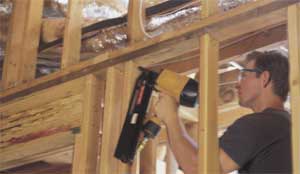Carpenter
Tasks & duties

Carpenters may do some or all of the following:
-
study building plans and drawings, and other documents
-
make formwork (boxing) for concrete structures
-
select timber and other materials
-
cut building materials to the right size and shape
-
remove and repair damaged or worn parts
-
nail, screw or glue the pieces together
-
trim and sand the item and apply primer if applicable
-
fit the prepared items such as windows, staircases and doors into buildings
-
ensure that the prepared items are weather tight
Specialisations
Carpenters may specialise in either residential or commercial carpentry, although they carry out similar tasks.
Skills & knowledge

Carpenters need to have:
-
building and carpentry skills
-
knowledge of building methods and materials
-
understanding of building and safety regulations
-
skill interpreting drawings and architectural plans
-
communication skills for dealing with clients, architects and other contractors
-
practical skills, including skill caring for their carpentry tools and equipment
-
knowledge of health and safety procedures on building sites
-
good planning and organisational ability
-
maths skills
Entry requirements
There are no specific entry requirements for becoming a carpenter. However, many employers prefer to hire carpenters who have, or are working towards, a qualification.
You can complete an apprenticeship and gain a National Certificate in Carpentry (Level 4). The Building and Construction Industry Training Organisation (BCITO) oversees carpentry apprenticeships.
If you are an experienced carpenter with no qualifications, you can approach BCITO to have your skills assessed and gain a National Certificate in Carpentry (Level 4).
For further information contact the Building and Construction Industry Training Organisation.
Secondary education
It is preferred that carpenters have three years of secondary education. Useful subjects include English, maths, technical drawing, science, woodwork or workshop technology.
Tertiary education
Pre-employment courses for those wanting to undertake a carpentry apprenticeship are available at some polytechnics.
Registration
Some building work has to be carried out or overseen by a Licensed Building Practitioner. To get a licence, you have to prove your experience and/or have appropriate qualifications.. For further information contact the Licenced Building Practitioners website - information on applying for a licence.
Useful experience
Useful experience for carpenters includes: factory work, draughting, woodwork or any work in the building construction industry.
Related courses
Carpentry and Joinery
For more information, please refer to Career Services.
Document Actions
